Aug 14, 2024
Introduction of Chapter # 6 (Al An'am)
بِسْمِ ٱللَّٰهِ ٱلرَّحْمَٰنِ ٱلرَّحِيمِ,
(bi-smi llāhi r-raḥmāni r-raḥīm)
"In the name of Allah, the Most Gracious, the Most Merciful"
"Assalamualaikum/Hello and welcome! It's a pleasure to have you join us on this platform. Feel free to explore and engage with our community."
Feel free to join the cafe and our Instagram page for notifications and updates;
Hilokal;
https://hilokal.page.link/eUxfM
Instagram;
https://instagram.com/ideologyovlife?igshid=NjIwNzIyMDk2Mg==
Chapter 6, Introduction
Surah Al An'am, Shan e Nuzool
Recitation.
Translation.
Tafseer.
Difficult Vocabularies from INTRODUCTION (Chapter # 6 Al An'am)
1- Superstitious. (Adjective)
(Based on or believing in superstitions (= beliefs based on old ideas about luck and magic rather than science or reason).)
2- Idolatrous. (Adjective)
(Relating to the religious practice of praying to a picture or object.)
3- Delve. (Verb)
(To reach into something or under the surface of something trying find an object.)
4- Fierce. (Adjective)
(Physically violent and frightening.)
5- Antagonism. (Noun)
(Hate, extreme unfriendliness, or active opposition to someone.)
6- Savage. (Adjective)
(Extremely violent, wild, or frightening.)
7- Deprived. (Adjective)
(Not having the things that are necessary for a pleasant life, such as enough money, food, or good living conditions.)
8- Obduracy. (Noun)
(The quality of being very determined to act in a particular way despite what anyone else says.)
9- Derision. (Noun)
(The situation in which someone or something is laughed at and considered stupid or of no value.)
10- Refute. (Verb)
(To say or prove that a person, statement, opinion, etc. is wrong or false.)
11- Inculcate. (Verb)
(To fix beliefs or ideas in someone's mind, especially by repeating them often.)
12- Obstacle. (Noun)
(something that blocks you so that movement, going forward, or action is prevented or made more difficult.)
13- Depict. (Verb)
(To represent or show something in a picture or story.)
14- Pagan. (Adjective)
(Belonging or relating to a religion that worships many gods, especially one that existed before the main world religions.)
Chapter No. 6 – Surah Al Anaam (The Cattle)
Lessons in Guidance and Accountability
Introduction
This Surah takes its name from the verses. 136, 138 and 139 in which some superstitious beliefs of the idolatrous Arabs concerning the lawfulness of some cattle (an`am) and the unlawfulness of some others have been refuted.
It is the sixth chapter of the Quran, containing 165 verses (ayat). It is a significant chapter, offering a wealth of guidance and wisdom to Muslims. The chapter’s title, “An’am,” translates to “Cattle” in English, and the Surah encompasses a broad range of themes, such as touching upon theology, morality, and spirituality. In today’s lesson, we will explore the key themes and lessons from Surah An’am, delving into its historical context and its relevance in the lives of believers today.
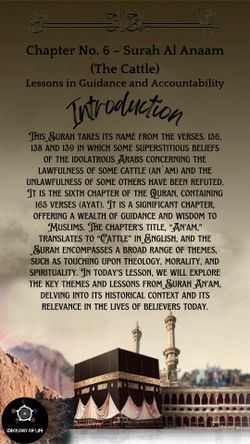
Period of Revelation
Surah An’am was revealed in Mecca during the early period of the Prophet Muhammad’s mission. At this time, the Prophet and his followers were facing fierce opposition from the Quraysh tribe, who resisted the message of Islam. The Surah addresses various aspects of faith, guidance, and the signs of Allah’s existence and power.
According to a tradition of Ibn Abbas, the whole of the Surah was revealed at one sitting at Makkah. Asma, a daughter of Yazid and a first cousin of Hadrat Mu'az-bin Jabl, says, "During the revelation of this Surah, the Holy Prophet was riding on a she-camel and I was holding her nose-string. The she-camel began to feel the weight so heavily that it seemed as if her bones would break under it." We also learn from other traditions that the Holy Prophet dictated the whole of the Surah the same night that it was revealed.
Its subject-matter clearly shows that it must have been revealed during the last year of the Holy Prophet's life at Makkah. The tradition of Asma, daughter of Yazid, also confirms this. As she belonged to the Ansar and embraced Islam after the migration of the Holy Prophet to Yathrib, her visit to the Holy Prophet at Makkah must have taken place during the last year of his life there. For before this, his relations with those people were not so intimate that a woman from there might have come to visit him at Makkah.
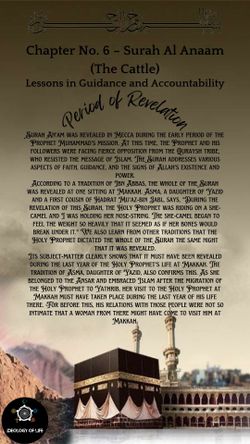
Occasion of Revelation
After determining the period of its revelation, it is easier to visualize the background of the Surah. Twelve years had passed since the Holy Prophet had been inviting the people to Islam. The antagonism and persecution by the Quraish had become most savage and brutal, and the majority of the Muslims had to leave their homes and migrate to Habash (Abyssinia). Above all, the two great supporters of the Holy Prophet. Abu Talib and Hadrat Khadijah, were no more to help and give strength to him. Thus he was deprived of all the worldly support. But in spite of this, he carried on his mission in the teeth of opposition. As a result of this, on the one hand, all the good people of Makkah and the surrounding clans gradually began to accept Islam ; on the other hand, the community as a whole, was bent upon obduracy and rejection. Therefore, if anyone showed any inclination towards Islam, he was subjected to taunts and derision, physical violence and social boycott. It was in these dark circumstances that a ray of hope gleamed from Yathrib, where Islam began to spread freely by the efforts of some influential people of Aus and Khazraj, who had embraced Islam at Makkah. This was a humble beginning in the march of Islam towards success and none could foresee at that time the great potentialities that lay hidden in it. For, to a casual observer, it appeared at that time as if Islam was merely a weak movement it had no material backing except the meager support of the Prophet's own family and of the few poor adherents of the Movement. Obviously the latter could not give much help because they themselves had been cast out by their own people who had become their enemies and were persecuting them.
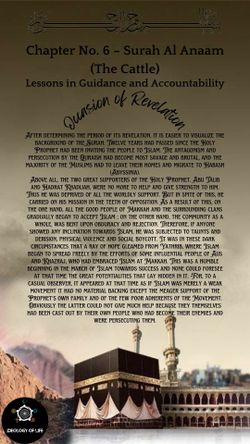
Topics
These were the conditions, when this discourse was revealed. The main topics dealt with in this discourse may be divided under seven headings:
1. Refutation of shirk and invitation to the creed of Tauhid.
2. Enunciation of the doctrine of the "Life-after- death." and refutation of the wrong notion that there was nothing beyond this worldly life.
3. Refutation of the prevalent superstitions.
4. Enunciation of the fundamental moral principles for the building up of the Islamic Society.
5. Answers to the objections raised against the person of the Holy Prophet and his mission.
6. Comfort and encouragement to the Holy Prophet and his followers who were at, that time in a state of anxiety and despondency because of the apparent failure of the mission.
7. Admonition, warning and threats to the disbelievers and opponents to give up their apathy and haughtiness. It must, however, be noted that the above topics have not been dealt with one by one under separate headings, but the discourse goes on as a continuous whole and these topics come under discussion over and over again in new and different ways.
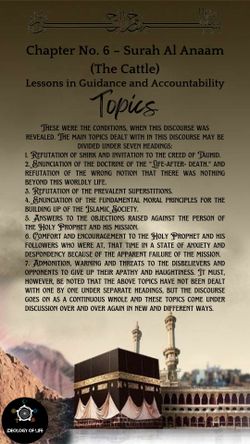
Subject :Islamic Creed.
This Surah mainly discusses the different aspects of the major articles of the Islamic Creed: Tauhid, Life-after-death, Prophethood and their practical application to human life. Side by side with this, it refutes the erroneous beliefs of the "opponents and answers their objections, warns and admonishes them and comforts the Holy Prophet and his followers, who were then suffering from persecution.
Of course, these themes have not been dealt with under separate heads but have been blended in an excellent manner.
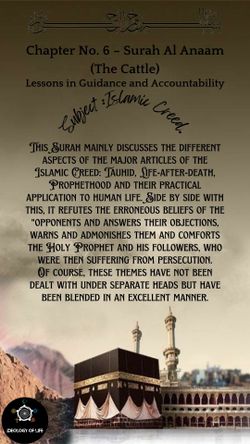
Topics and their Interconnection
From Verses 1 - 12
These verses are of introductory and admonitory nature. The disbelievers have been warned that if they do not accept the Islamic Creed and follow the 'Light' shown by the Revelation from the All-Knowing and All-Powerful Allah, they would go to the same doom as the former disbelievers did. Their arguments for rejecting the Prophet and the Revelation sent down to him have been refuted and a warning has been given to them that they should not be deluded by the respite that is being granted to them.
From Verses 13 - 24
These verses inculcate Tauhid, and refute shirk which is the greatest obstacle in the way of its acceptance.
From Verses 25 - 32
In these verses, a graphic scene of the life in the Hereafter has been depicted in order to warn the disbelievers of the consequences of the rejection of the Articles of Faith.
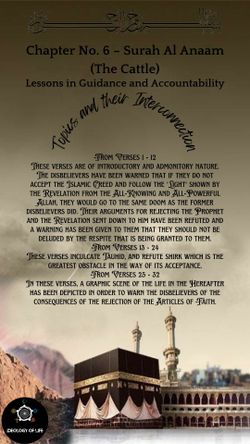
Topics and their Interconnection
From Verses 33 - 73
Prophethood is the main theme which has been discussed from the point of view of the Holy Prophet, his Mission, the limitations of his powers, the attitude towards his followers and also from the point of view of the disbelievers.
From Verses 74 - 90
In continuation of the same theme, the story of Prophet Abraham has been related to bring home to the pagan Arabs that the Mission of Prophet Muhammad, which they were opposing, was the same as that of Prophet Abraham (Allah's peace be upon them). This line of argument was adopted because they considered themselves to be his followers, especially the Quraish who were proud of being his descendants as well.
From Verses 91- 108
Another proof of his Prophethood is the Book, which has been sent down to him by Allah, for its teachings show the right guidance in regard to creed and practice.
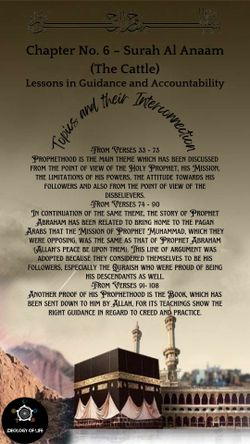
Topics and their Interconnection
From Verses 109 - 154
Divine restrictions have been contrasted with the superstitious restrictions of the pagan Arabs in order to show the striking differences between the two and thus prove the Quran to be a Revealed Book.
From Verses 155 - 160
The Jews, who were criticized in vv. 144 - 147 along with the pagan Arabs, have been urged to compare the teachings of the Quran with those of the Torah so that they might recognize their similarity and give up their lame excuses against it, and adopt its Guidance to escape the retribution on the Day of Resurrection.
From Verses 161 - 165
This is the conclusion of the discourse: the Holy Prophet has been instructed in a beautiful and forceful manner to proclaim fearlessly the articles of the Islamic Creed and their implications.
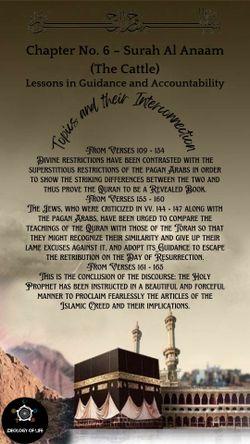
Relevance in Today’s World
Surah An’am’s teachings remain highly relevant in the lives of Muslims today. The concept of monotheism and the oneness of God serves as a cornerstone of Islamic belief, anchoring the faith and guiding the daily lives of Muslims. In a world with diverse beliefs and ideologies, this theme encourages believers to maintain their devotion to the one true God.
The emphasis on reflection on the signs of God in the natural world is particularly pertinent in the modern age of science and technology. It highlights the compatibility of faith and reason, encouraging believers to explore the wonders of the universe.
The concept of accountability and the Day of Judgment is a reminder that one’s actions have consequences and encourages individuals to lead righteous lives. In a world with growing concerns about ethics and morality, this theme provides a moral compass for Muslims.
Surah An’am’s teachings on individual responsibility and free will are relevant in the context of personal development and decision-making. It empowers individuals to make conscious and responsible choices in their lives.
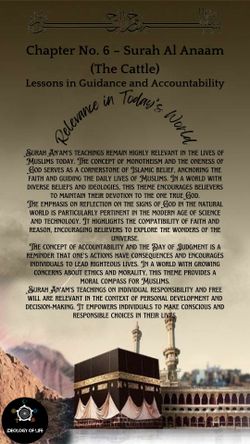
Conclusion
Surah An’am is a chapter in the Quran that continues to provide profound guidance and wisdom to Muslims. Its themes of monotheism, creation, prophethood, accountability, and ethical living offer valuable insights and principles for believers in navigating the complexities of modern life. By internalizing and applying the lessons from Surah An’am, Muslims can find spiritual strength, guidance, and a sense of purpose in a world marked by diversity and challenges.
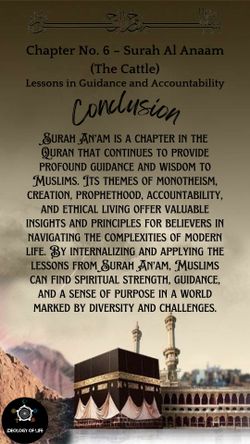
Thankyou everyone for joining.
May Allah rewards all of you for your precious time spent here & may Allah keeps pouring his blessings upon you and your loved ones.
Stay safe & and blessed.
Aslamualaikum to all of you.
By undefined
23 notes ・ 5 views
English
Proficient